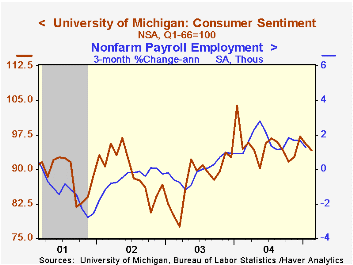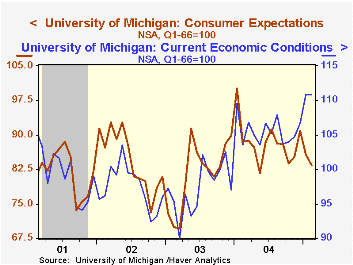 Global| Feb 18 2005
Global| Feb 18 2005U.S. Consumer Sentiment Slipped Further
by:Tom Moeller
|in:Economy in Brief
Summary
The preliminary February index of consumer sentiment from the University of Michigan fell to 94.2 versus Consensus expectations for stability at 95.5. During the last ten years there has been a 74% correlation between the level of [...]

The preliminary February index of consumer sentiment from the University of Michigan fell to 94.2 versus Consensus expectations for stability at 95.5. During the last ten years there has been a 74% correlation between the level of consumer sentiment and the y/y change in real PCE.
The decline was due to a lower reading of consumer expectations which fell 2.7% m/m on top of a 5.7% decline in January. The decline in expectations was to the lowest level since last May and due to reduced expectations for business conditions & real income growth.
The reading of current conditions was stable. Sentiment regarding personal finances vs. a year ago jumped. During the last ten years there has been an 81% correlation between the current conditions index and y/y growth in payroll employment. Buying conditions for large household goods improved on strong gains in 4Q04.
The University of Michigan survey is not seasonally adjusted.The mid-month survey is based on telephone interviews with 250 households nationwide on personal finances and business and buying conditions. The survey is expanded to a total of 500 interviews at month end.
| University of Michigan | Feb | Jan | Y/Y | 2004 | 2003 | 2002 |
|---|---|---|---|---|---|---|
| Consumer Sentiment | 94.2 | 95.5 | -0.2% | 95.2 | 87.6 | 89.6 |
| Current Conditions | 110.9 | 110.9 | 7.0% | 105.6 | 97.2 | 97.5 |
| Consumer Expectations | 83.4 | 85.7 | -5.8% | 88.5 | 81.4 | 84.6 |
Tom Moeller
AuthorMore in Author Profile »Prior to joining Haver Analytics in 2000, Mr. Moeller worked as the Economist at Chancellor Capital Management from 1985 to 1999. There, he developed comprehensive economic forecasts and interpreted economic data for equity and fixed income portfolio managers. Also at Chancellor, Mr. Moeller worked as an equity analyst and was responsible for researching and rating companies in the economically sensitive automobile and housing industries for investment in Chancellor’s equity portfolio. Prior to joining Chancellor, Mr. Moeller was an Economist at Citibank from 1979 to 1984. He also analyzed pricing behavior in the metals industry for the Council on Wage and Price Stability in Washington, D.C. In 1999, Mr. Moeller received the award for most accurate forecast from the Forecasters' Club of New York. From 1990 to 1992 he was President of the New York Association for Business Economists. Mr. Moeller earned an M.B.A. in Finance from Fordham University, where he graduated in 1987. He holds a Bachelor of Arts in Economics from George Washington University.
More Economy in Brief
 Global| Feb 05 2026
Global| Feb 05 2026Charts of the Week: Balanced Policy, Resilient Data and AI Narratives
by:Andrew Cates






